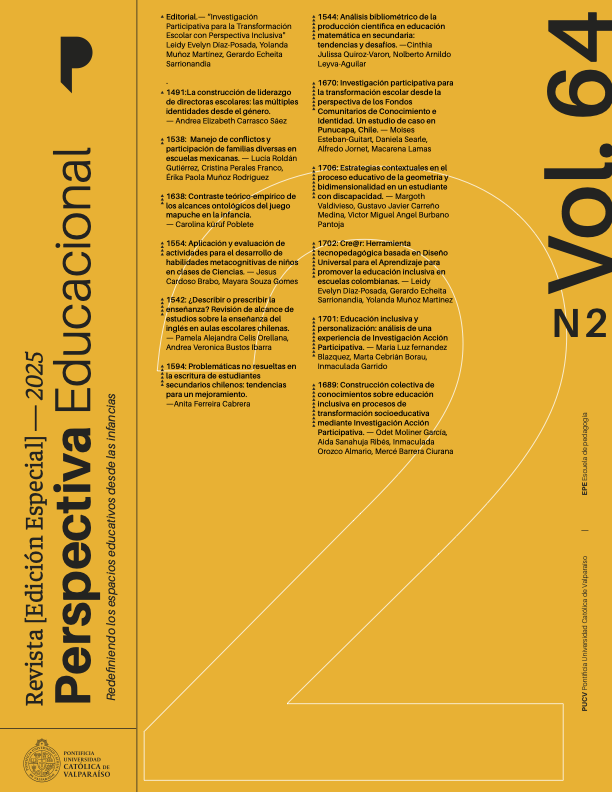Educación inclusiva y personalización: análisis de una experiencia de Investigación Acción Participativa
DOI:
https://doi.org/10.4151/07189729-Vol.64-Iss.2-Art.1701Palabras clave:
Educación inclusiva herramienta tecnopedagógica Diseño Universal para el Aprendizaje Investigación Basada en Diseño investigación participativaResumen
Este trabajo recoge un proceso de Investigación Acción Participativa (IAP) desarrollado por un grupo de 17 personas, 16 de ellas docentes de ocho centros educativos en España, que buscaban mejorar los procesos de personalización de la enseñanza en sus centros educativos. El concepto “personalización” figura en la vigente ley de educación de este país. Desde él se pone el foco en mejorar la presencia, la participación y el aprendizaje de todo el alumnado, facilitando una respuesta educativa que parta de sus gustos, competencias, intereses y capacidades. La intención es facilitar la atribución de un mayor sentido y significado a los aprendizajes presentes y para el futuro del alumnado. El trabajo que se presenta tiene un doble objetivo: (1) sistematizar el proceso de investigación seguido y (2) analizar la IAP como herramienta metodológica, identificando, entre otras cuestiones, los aprendizajes, retos y fortalezas que el equipo de investigación identifica en este proceso.
Citas
Ainscow, M. (2020). Inclusion and equity in education: Making sense of global challenges. Prospects, 49(2), 123-134. https://doi.org/10.1007/s11125-020-09506-w
Ainscow, M., Booth, T., & Dyson, A. (2006). Improving Schools, Developing Inclusion. Routledge. https://doi.org/10.4324/9780203967157
Ainscow, M., Dyson, A., Goldrick, S., & West, M. (2013). Promoviendo la equidad en educación. Revista de investigación en educación, 11(3), 44-56. https://bit.ly/3LtuOFe
Amor, A., Hagiwara, M., Shogren, K., Thompson, J., Verdugo, M. A., Burke, K., & Aguayo, V. (2018). International perspectives and trends in research on inclusive education: a systematic review, International Journal of Inclusive Education, 23(12), 1277-1295. https://doi.org/10.1080/13603116.2018.1445304
Ares, I. (2021). La investigación acción participativa como herramienta para la transformación inclusiva del espacio educativo de una escuela de educación primaria en Zaragoza. REIIT Revista Educación, Investigación, Innovación y Transferencia, (1), 1-30. https://doi.org/10.26754/ojs_reiit/eiit.202115445
Astudillo, L., Simón, C., & Fernández-Blázquez, M. L. M. (2025). Current Roles of Support Teachers, Analysis of Their Contribution to Inclusive School: A Narrative Review. Disabilities, 5(1), 23. https://doi.org/10.3390/disabilities5010023
Balcazar, E. (2003). Investigación acción participativa (IAP): Aspectos conceptuales y dificultades de implementación. Fundamentos en Humanidades, (7), 59-77.
Booth, T., & Ainscow, M. (2015). Guía para la educación inclusiva. Desarrollando el aprendizaje y la participación en los centros escolares (3.a ed.). Grafilia. https://doi.org/10.15366/reice2015.13.3.001
Braun, V., & Clarke, V. (2006). Using thematic analysis in psychology. Qualitative Research in Psychology, 3(2), 77-101. https://doi.org/10.1191/1478088706qp063oa
Braun, V., & Clarke, V. (2019). Reflecting on reflexive thematic analysis. Qualitative Research in Sport, Exercise and Health, 11(4), 589-597. https://doi.org/10.1080/2159676X.2019.1628806
Carratalá, A., Mata, G., & Crespo, S. (2017). Planificación centrada en la persona: planificando por adelantado el futuro deseado. Plena Inclusión España. https://lc.cx/WWCvfk
Center for Applied Special Technology. (2024). Universal Design for Learning guidelines (v. 3.0). CAST.
Centro Español de Documentación e Investigación sobre Discapacidad. (2023). Estudio sobre la transformación de las escuelas en espacios inclusivos y accesibles. Real Patronato sobre Discapacidad, Ministerio AS y Agenda 2030.
Coll, C. (2018). La personalización al servicio del aprendizaje escolar. Dossier 3. Graó.
Comité sobre los Derechos de las Personas con Discapacidad (2024, 22 de marzo). Informe del Comité. Seguimiento a la Investigación sobre España realizada por el comité en virtud del artículo 6 del Protocolo Facultativo de la Convención. https://www.sindromedown.org/storage/2024/04/20240322-CRPD_C_ESP_FUIR_1_9983_S.pdf
Creswell, J. W. (2013). Qualitative inquiry and research design. choosing among five approaches (3.ª ed.). Sage.
Denzin, N. K., & Lincoln, Y. S. (2012). Introducción general. La investigación cualitativa como disciplina y como práctica. En N. K. Denzin, & Y. S. Lincoln (Coords.), Manual de investigación cualitativa. El campo de la investigación cualitativa (vol. 1, pp. 43-102). Gedisa editorial.
Echeita, G., Barrios, A., Gutiérrez, H., & Simón, C. (2018). Aulas inclusivas en una escuela para tod@s y con tod@s. Educadores: Revista de renovación pedagógica, (266), 30-42.
Echeita, G., & Simón, C. (Coords.). (2019). El papel de los Centros de Educación Especial en el proceso hacia sistemas educativos más inclusivos. Cuatro estudios de casos: Newham (UK), New Brunswick (Canadá), Italia y Portugal. Ministerio de Educación y Formación Profesional de España.
Espinosa, E. R. (2022). Nuevos sentidos de la convivencia en la escuela: sistematización de una experiencia de Investigación Acción Participativa con docentes. Revista Latinoamericana Estudios de la Paz y el Conflicto, 3(5), 87-104. https://doi.org/10.5377/rlpc.v3i5.12649
Fals Borda, O. (2022). El problema de cómo investigar la realidad para transformarla por la praxis. En Espacio Abierto, 31(1), 193-221. Tercer Mundo.
Flick, U. (2015). Introducing research methodology: A beginner's guide to doing a research project. Sage.
Florian, L., & Beaton, M. (2018). Inclusive pedagogy in action: getting it right for every child. International Journal of Inclusive Education, 22(8), 870-884. https://doi.org/10.1080/13603116.2017.1412513
Freire, P. (2009). Pedagogía de la autonomía (11.a ed.). Siglo XXI.
Fullan, M. (2021). The right drivers for whole system success. Centre for Strategic Education.
Gobierno de España. (2020). Ley Orgánica 3/2020, de 29 de diciembre, por la que se modifica la Ley Orgánica 2/2006, de 3 de mayo, de Educación (LOMLOE), artículo 7. Boletín Oficial del Estado, núm. 340, de 30 de diciembre de 2020. https://www.boe.es/eli/es/lo/2020/12/29/3
Göransson, K., & Nilholm, C. (2014). Conceptual diversities and empirical shortcomings- a critical analysis of research on inclusive education. European Journal of Special Needs Education, 29(3), 265-280. https://doi.org/10.1080/08856257.2014.933545
Herrera, M. D. M., Matés, C., Farzaneh, D., & Barrado, S. (2021). Caminando hacia la Inclusión a través de la Investigación Acción Participativa en una Comunidad Educativa. Revista latinoamericana de educación inclusiva, 15(2), 135-153. https://doi.org/10.4067/S0718-73782021000200135
Korsgaard, M., Larsen, V., & Wiberg, M. (2018). Thinking and researching inclusive education without a banister-visiting, listening and tact as a foundation for collective research on inclusive education. International Journal of Inclusive Education, 24(5), 496-512. https://doi.org/10.1080/13603116.2018.1469680
Lambrecht, J., Lenkeit, J., Hartmann, A., Ehlert, A., Knigge, M., & Spörer, N. (2022). The effect of school leadership on implementing inclusive education: How transformational and instructional leadership practices affect individualised education planning. International Journal of Inclusive Education, 26(9), 943-957. https://doi.org/10.1080/13603116.2020.1752825
Lindner, K.-T., & Schwab, S. (2020). Differentiation and individualisation in inclusive education: A systematic review and narrative synthesis. International Journal of Inclusive Education, 1-21. https://doi.org/10.1080/13603116.2020.1813450
Martín, E., & Marchesi, A. (2014). Calidad de la enseñanza en tiempos de crisis. Alianza.
Messiou, K. (2017). Research in the field of inclusive education: time for a rethink? International Journal of Inclusive Education, 21(2), 146-159. https://doi.org/10.1080/13603116.2016.1223184
Messiou, K. (2019). The missing voices: students as a catalyst for promoting inclusive education. International Journal of Inclusive Education, 23(7-8), 768-781. https://doi.org/10.1080/13603116.2019.1623326
Miles, M., Huberman, M., & Saldaña, J. (2014). Qualitative data analysis. A methods Sourcebook (3.ª ed.). SAGE Publications.
Montañés, M. (2009). Metodología y técnica participativa. Teoría y práctica de una estrategia de investigación participativa. Editorial UOC.
Morin, E. (2004). La mente bien ordenada: repensar la reforma, reformar el pensamiento (6.ª ed.). Seix Barral.
Muñoz, Y., & Porter, G. L. (2020). Planning for all students: Promoting inclusive instruction. International Journal of Inclusive Education, 24(14), 1552-1567. https://doi.org/10.1080/13603116.2020.1813450
Nairaian, S., & Schlessinger, S. (2017). When theory meets the “reality of reality”: Reviewing the sufficiency of the social model of disability as a foundation for teacher preparation for inclusive education. Teacher Education Quarterly, 44(1), 81-100. https://www.jstor.org/stable/90003619?seq=1#page_scan_tab_contents1
Nilholm, C. (2020). Research about inclusive education in 2020 – How can we improve our theories in order to change practice? European Journal Of Special Needs Education, 36(3), 358-370. https://doi.org/10.1080/08856257.2020.1754547
Norwich, B. (2014). Changing policy and legislation and its effects on inclusive and special education: a perspective from England. British Journal of Special Education, 41(4), 403-425. https://doi.org/10.1111/1467-8578.12079
Organización de las Naciones Unidas para la Educación, la Ciencia y la Cultura. (2020). Towards inclusion in education: status, trends and challenges: the UNESCO Salamanca Statement 25 years on. UNESCO. https://unesdoc.unesco.org/ark:/48223/pf0000374246
Parrilla, A., Susinos, T., Gallego-Vega, C., & Martínez, B. (2017). Revisando críticamente cómo investigamos en educación inclusiva: cuatro proyectos con un enfoque educativo y social. Revista interuniversitaria de formación del profesorado, 31(89), 145-156. https://dialnet.unirioja.es/servlet/articulo?codigo=6129226
Roulston, K. J. (2007). Reflective interviewing: A guide to theory and practice. SAGE Publications.
Saldaña, J. (2016). The coding manual for qualitative researchers (3.a ed.). SAGE Publications.
Schlessinger, S. (2018). Reclaiming teacher intellectualism through and for inclusive education, International Journal of Inclusive Education, 22(3), 268-284. https://doi.org/10.1080/13603116.2017.1362598
Schön, D. (1992). La formación de los profesionales reflexivos. Paidós-MEC.
Simón, C., & Barrios, Á. (2019). Las familias en el corazón de la educación inclusiva. Aula Abierta, 48(1), 51-58. https://doi.org/10.17811/rifie.48.1.2019.51-58
Simón, C., Palomo, R., & Echeita, G. (2024). The duty to promote an inclusive educational system: A phenomenological study on the assessment procedures of pupils with special educational needs in Madrid (Spain). International Journal of Inclusive Education, 28(6), 803-819. https://doi.org/10.1080/13603116.2021.1968513
Slee, R. (2019). Belonging in an age of exclusion. International Journal of Inclusive Education, 23(9), 909-922. https://doi.org/10.1080/13603116.2019.1602366
Stake, R. (2013). Estudio de casos cualitativos. En N. K. Denzin, & Y. S. Lincoln (Coords.), Manual de investigación cualitativa. Las estrategias de investigación cualitativa (vol. 3, pp. 43-102). Gedisa editorial.
Susinos, T. (2017). La participación de los estudiantes: mucho más que un bazar de buenas intenciones. Organización y gestión educativa: Revista del Fórum Europeo de Administradores de la Educación, 25(6), 27-31.
Susinos, T., Ceballos, N., Sáiz, Á., & Allica, C. (2018). Cuando todos cuentan: experiencias de participación de estudiantes en las escuelas. Arco/Libros, La Muralla.
Uthus, M., & Qvortrup, A. (2024). Lessons learned from Norway: a values-based formulation of inclusive education. European Journal of Special Needs Education, 40(2), 244-258. https://doi.org/10.1080/08856257.2024.2354603
Van Mieghem, A., Verschueren, K., Petry, K., & Struyf, E. (2018). An analysis of research on inclusive education: A systematic search and meta-review. International Journal of Inclusive Education, 24(6), 675-689. https://doi.org/10.1080/13603116.2018.1482012
Verdugo, M. A., Gómez, L., Arias, B., Santamaría, M., Clavero, D., & Tamarit, J. (2013). Escala INICO-FEAPS: Evaluación Integral de la Calidad de Vida de personas con Discapacidad Intelectual o del Desarrollo. INICO. https://sid-inico.usal.es/documentacion/escala-inico- feaps-evaluacion-integral-de-la-calidad-de-vida-de-personas-con-discapacidad-intelectual-o-del-desarrollo/
Verdugo, M. A., Vicente, E., Gómez, M., Fernández, R., Wehmeyer, M., Badia, M., González, F., & Calvo, M. I. (2014). Escala ARC-INICO de Evaluación de la Autodeterminación Manual de aplicación y corrección. INICO. https://sid.usal.es/idocs/F8/FDO26898/herramientas_autodeterminacion.pdf
Descargas
Publicado
Cómo citar
Número
Sección
Categorías
Licencia
Derechos de autor 2025 mluz fernandez blazquez, Marta Cebrián Borau, Inmaculada Garrido Jiménez

Esta obra está bajo una licencia internacional Creative Commons Atribución-CompartirIgual 4.0.
El/los autores/as otorgan licencia exclusiva y sin límite de temporalidad para que el manuscrito sea publicado en la revista Perspectiva Educacional, editada por la Pontificia Universidad Católica de Valparaíso (Chile), a través de la Escuela de Pedagogía.





